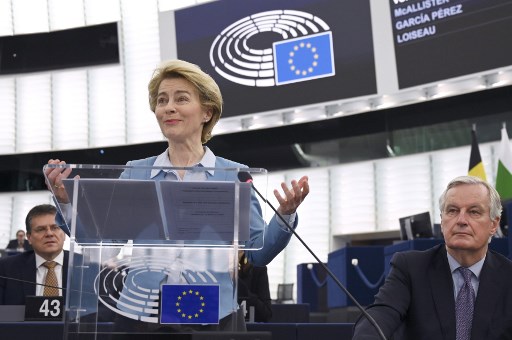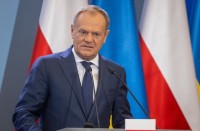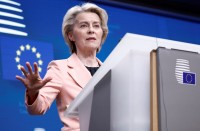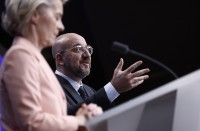
by Anne-Laure MONDESERT / Dave CLARK
Agence France Presse
EU chief Ursula von der Leyen faces the deepest political crisis of her mandate so far, under intense fire over delayed vaccine deliveries and the bungled roll-out of export controls.
No-one expects the storm to drive her from office — she still has powerful backing in Paris and Berlin — but the attacks underline concerns about Brussels’ coronavirus strategy.
In Brussels, Dublin and London criticism focused on the European Commission’s aborted move to impose vaccine export controls on the border between Ireland and Northern Ireland.
But beyond the EU bubble, politicians and citizens across the bloc are voicing frustration at coronavirus vaccination rates falling behind those in the US, UK and Israel.
And von der Leyen’s personal style has come under fire, with some in Brussels accusing her of relying on a tight-knit inner circle and by-passing Commission experts.
The main political groups in the European Parliament called the former German minister in for a series of grillings on Tuesday, fuelling the mood of crisis.
Even von der Leyen’s predecessor in Brussels’ top job, Jean-Claude Juncker, has joined the chorus of criticism, and some diplomats are privately scathing.
In an interview with Le Monde, von der Leyen admitted to some missteps.
“When you take urgent decisions, and in this year of crisis we’ve taken around 900, there’s always the chance of missing something,” she told the French daily.
– Tight-knit circle –
For commentator Eric Maurice, of Brussels’ think tank the Fondation Robert Schuman, it’s natural that von der Leyen is in the front line, having seized on the issue.
“Von der Leyen is under pressure from the member states who don’t see vaccines arriving and do see public expectations rising,” he told AFP.
The EU chief created, in Maurice’s view, too great an expectation through her optimistic communication strategy “even though we knew vaccines wouldn’t be ready in January”.
But, in her defence, she became an “easy scapegoat” for the EU member states when she took charge of the plan.
The European Commission and von der Leyen’s defenders say that if Brussels had not taken charge of coordinating vaccine policy there would have been competition between EU capitals.
International drugs firms would have driven a harder bargain and smaller member states would have lost out to the power of major players such as France and Germany.
They also defend Europe’s cautious approach to licensing, taking time to negotiate liability clauses with manufacturers and allowing the European Medicines Agency space to vet vaccines.
But in the meantime, UK authorities have raced ahead on jabs and vaccine firms have issued warnings that they will not meet their promised advance shipments, triggering a furious row.
Von der Leyen has hit back hard at British-Swedish giant AstraZeneca in particular, accusing the firm of falling short on contractual commitments to supply EU governments.

But, on Friday, when her commission unveiled a transparency strategy designed to monitor and if necessary block vaccine exports from EU plants, it had to backtrack.
The new rules, as unveiled to the press but quickly modified, enraged Dublin and London by invoking a clause in the Brexit withdrawal agreement to control the Irish border.
This clause was dropped, but it proved a humiliating climbdown, and von der Leyen has been accused of trying to shift responsibility for the gaffe onto officials outside her office.
Several European diplomats in Brussels said von der Leyen’s widely reported tendency to rely on a small number of trusted aides had let her down in such a complex crisis.
One told AFP the president relies on a “very, very small group of mostly German officials, without really using the formidable bureaucracy of 30,000 European employees.”
More than the battering she will get from MEPs, Brussels watchers expect von der Leyen’s position to be weakened in relation to the powerful EU member state leaders.
– Lessons drawn? –
“She might be a bit more beholden to the member states. I don’t know if that’s a good thing because, in all fairness, you need a balance,” one member state diplomat said.
“At the same time, you would hope that she’ll draw some lessons from this,” he said, suggesting the Northern Ireland oversight had shown the limits of her small team.
Nevertheless, experts like the European Policy Centre’s director Fabien Zuleeg do not think the vaccine crisis will be the end of von der Leyen.
“I think it takes a lot more for anyone to seriously think about removing a commission president. Getting a Commission into place is difficult enough,” he told AFP.
“Of course if there are continuous problems, then that’s a different question,” he added.
© Agence France-Presse







